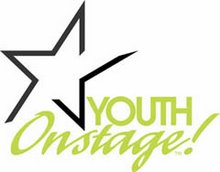
In rehearsal on Saturday, Eugene told us that when he thinks of total "freedom" the image he sees is Will Ferrell running around naked in the movie "Old School."
There are different ideas of freedom, but most of us tend to think of it as an individual thing, the freedom to do whatever you want. We think of a lone person doing something that goes against the grain -- like taking off all of their clothes!
Judy led the group in an exercise on Saturday that challenged our ideas of freedom, though. She told the cast that they had one and a half minutes to be "completely free on their own." Most of them had no idea what to do and just ended up sitting around. Then they had one and half minutes to be free "in a group": one group went upstairs for a bit, another just sat around talking. Then they had time to "be free" while Judy played different types of music; even though she didn't tell them to dance, pretty much everyone in the group stood in a circle and moved to the music, at one point collectively choreographing dance moves.
In our discussion afterwards, we discussed how comfortable we are with varying degrees of freedom. Cynthia confessed that when she heard we were allowed to be completely free, she was worried that someone would take off their clothes (like Will Ferrell!) but no one did that. Gilbert said that when he has free time, he most enjoys doing something like listening to music or going on the Internet -- if he was just alone by himself in a room without the possibility of doing that, he wouldn't really know what to do.
Why do we think that most of the people in the group felt more comfortable "being free" together? Is that just because it's easier to just go along with the group or was dancing with everyone else what they really felt like doing? Freedom to choose can be a paradox; it doesn't always have to mean that we "do our own thing." Though the conventional image of freedom is individualistic, groups can also freely choose to come to consensus, can't they? Or is someone always the leader?
We'll be exploring this paradox more in rehearsal tonight. When you think of "freedom," what image do YOU see?
